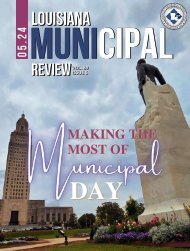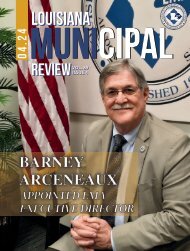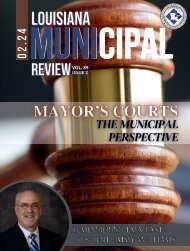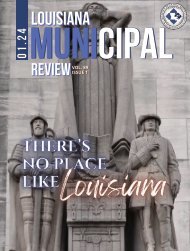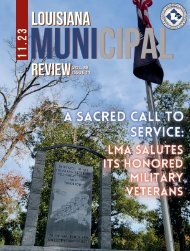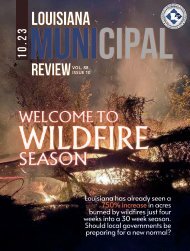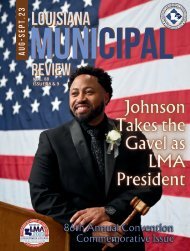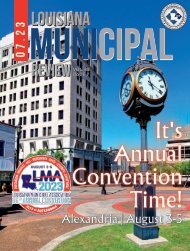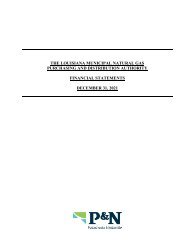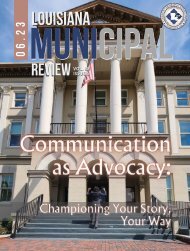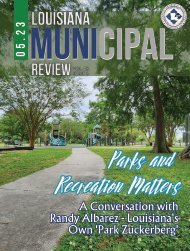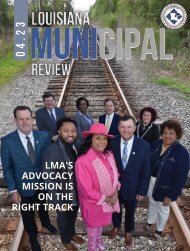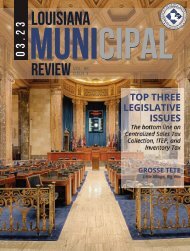LMR JULY 2020
July 2020 Louisiana Municipal Review
July 2020 Louisiana Municipal Review
You also want an ePaper? Increase the reach of your titles
YUMPU automatically turns print PDFs into web optimized ePapers that Google loves.
Legal Briefs
A BIG SUMMER FOR SCOTUS
BY KAREN DAY WHITE, EXECUTIVE COUNSEL
Despite the on-going pandemic, the
US Supreme Court tackled some pretty
weighty issues over its summer term,
some of which were addressed (for
now) by the simple refusal of SCOTUS
to hear certain matters.
In a 6-3 decision in Bostock v. Clayton County, the court
held that gay and transgender employees may sue their
employers under Title VII of the Civil Rights Act for discriminating
against them because of their sexual orientation
or gender identity. This replaces a patchwork of state
laws that did or did not allow such discrimination claims.
Following a fascinating analysis of the term “sex” in relation
to Title VII, the court developed a common sense bottom
line articulated by Justice Gorsuch in the majority opinion:
“ . . . if changing the employee’s sex would have yielded a
different choice by the employer—a statutory violation
has occurred.” In other words, the preferences and feelings
of the person are only offensive to the employer because
of that person’s sex.
Justices Alito, Thomas, and Kavanaugh dissented in two
separate opinions, arguing that it is Congress’ duty to
amend Title VII to include these protections, that such
is a legislative function and not the responsibility of the
judiciary.
With SCOTUS refusing to hear thousands of cases each
year, it is not often that the refusal to hear a matter is big
news. But this year, it is.
In total, the court denied nine petitions involving qualified
immunity for law enforcement officers, a topic that has
become increasingly prominent in our national dialogue
since the death of George Floyd. Since the 1960s, the
doctrine of qualified immunity has protected police officers
from individual liability unless the officer violated a
clearly established constitutional right. It is essentially an
examination of the officer’s actions as reasonable or not
based on what he knew at the time. If qualified immunity
applies, then money damages are not available; if qualified
immunity does not apply, then, while the government
employee may technically be responsible for money
damages, the government entity virtually always pays. So,
qualified immunity also protects state and local governments
from having to pay money damages for actions that
are not clear constitutional violations.
By refusing to hear any of the petitions that requested an
alteration or repeal of qualified immunity, SCOTUS made
a clear statement that it is not ready to consider any such
movement at this time. It is likely, however, that they
cannot avoid that discussion for much longer, so the LMA
stands ready to defend qualified immunity through appropriate
state and federal channels.
The court also refused to hear 10 petitions involving guns
that raised a variety of legal issues, but the primary focus
was on the authority of state and local governments to
regulate the possession and carrying of firearms outside
of the home. In 2008 in District of Columbia v. Heller, the
court held that the Second Amendment “guarantee[s] the
individual right to possess and carry weapons in case of
confrontation” within the home. There has been no declaration
from SCOTUS beyond that since.
Justices Thomas and Kavanaugh would have preferred
to take up a case involving a New Jersey law requiring
private citizens to demonstrate a justifiable need to carry a
handgun outside the home. Justice Thomas opined: “This
Court would almost certainly review the constitutionality
of a law requiring citizens to establish a justifiable need
before exercising their free speech rights. And it seems
highly unlikely that the Court would allow a State to
enforce a law requiring a woman to provide a justifiable
need before seeking an abortion. But today, faced with
a petition challenging just such a restriction on citizens’
Second Amendment rights, the Court simply looks the
other way.” The LMA has long advocated that the best
persons to make decisions about firearm zoning are local
officials who know their community’s needs, sensitivities,
and preferences. For now, we must wait on the highest
court to determine when it will provide any guidance or
mandates in this arena.
Page 8
LMR | JULY 2020



